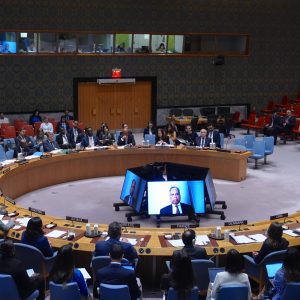Erdogan accuses West of backing Israeli ‘plans to spread war’
Istanbul, Turkey – AFP
Turkish President Recep Tayyip Erdogan on Wednesday accused Western powers of backing what he said were Israeli plans to attack Lebanon and “spread war” throughout the region.
“Israel is now setting its sights on Lebanon and we see that Western powers behind the scenes are patting Israel on the back,” he told lawmakers from his ruling AKP party.
Israeli Prime Minister Benjamin “Netanyahu’s plans to spread the war to the region will lead to a great disaster,” he said.
“It is … pathetic that states that talk about freedom, human rights and justice are captives of a mentally-ill person like Netanyahu.”
His remarks came as concern soared over escalating threats and ongoing cross-border exchanges of fire between Israeli forces and Lebanon’s Hezbollah, fuelling fears it could descend into fully-fledged war.
Netanyahu has said Israeli forces are now winding up the most intense part of the Gaza war and will redeploy to the northern border, casting the move as defensive.
Last week, Israel said its plans for an offensive in Lebanon were “approved and validated”.
The Turkish leader’s remarks came two days after Foreign Minister Hakan Fidan warned Greece and Cyprus about getting involved in the ongoing Middle East conflict.
Speaking to Haberturk TV late on Monday, Fidan alleged there was “serious militarisation in southern Cyprus” which was being used as a base for “intelligence and military flights” towards Gaza, citing intelligence reports.
Turkey, he said, had warned them against getting involved in the conflict.
“When you get involved in the ongoing wars in the Middle East, when you take sides, this fire will come and find you too,” he said.
Last week, Hezbollah chief Hassan Nasrallah warned Cyprus against opening its airports and bases to Israel “to target Lebanon”, saying it would face retaliation.
But the Cypriot government in Nicosia swiftly denied any part in Israel’s war on Gaza and said it would not “become involved in any military conflicts”.










